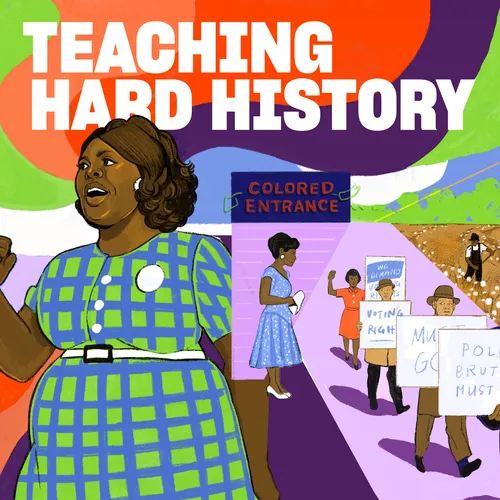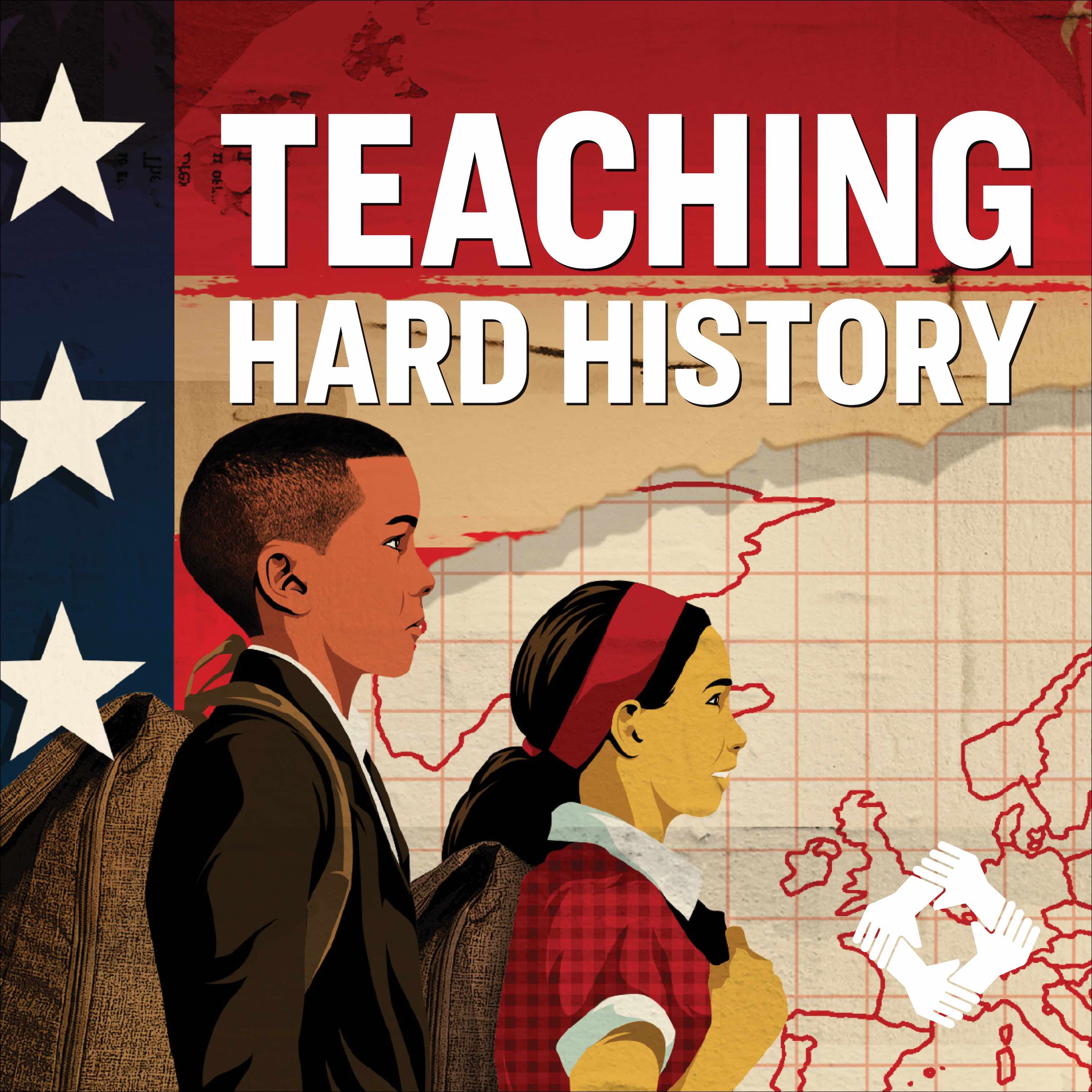
Teaching Hard History
From Learning for Justice and host Hasan Kwame Jeffries, Ph.D., Teaching Hard History brings us the crucial history we should have learned through the voices of leading scholars and educators. The series, which includes four seasons that originally aired from 2018 to 2022, begins with the long and brutal legacy of slavery and reaches through the victories of and violent responses to the Civil Rights Movement and Black Americans’ experiences during the Jim Crow era to the issues we face today.
Join us as we relaunch this podcast series, highlighting an episode each week and including a new resource page with key points from the conversation, resources and connections for building learning experiences.
- Update frequency
- every 15 days
- Average duration
- 64 minutes
- Episodes
- 76
- Years Active
- 2018 - 2025

Premeditation and Resilience: Tulsa, Red Summer and the Great Migration – w/ David Krugler
Naming the 1921 Tulsa massacre a “race riot” is inaccurate. Historian David Krugler urges listeners to call this and other violent attacks what they were: premeditated attempts at ethnic cleansing. D…

Lynching: White Supremacy, Terrorism and Black Resilience – w/ Kidada Williams and Kellie Carter Jackson
Black American experiences during Jim Crow were deeply affected by the ever-present threat of lynching and other forms of racist violence. Historian Kidada Williams amplifies perspectives from Black …

Correcting History: Confederate Monuments, Rituals and the Lost Cause – w/ Karen Cox
The Lost Cause narrative would have us believe that Confederate monuments have always been celebrated, but people have protested them since they started going up. Historian Karen Cox unpacks how the …

Reconstruction 101: Progress and Backlash – w/ Kate Masur
Just months after the Civil War ended, former Confederates had regained political footholds in Washington, D.C. In her overview of Reconstruction, Kate Masur notes how—in the face of evolving, post-s…

The History of Whiteness and How We Teach About Race – w/ Edward E. Baptist and Aisha White
Historian Ed Baptist provides context on the creation and enforcement of a U.S. racial binary that endures today, as well as Black resistance as a force for political change. And Aisha White urges ed…

Creating Brave Spaces: Reckoning With Race in the Classroom – w/ Matthew R. Kay
People from all corners of public life are telling teachers to stop discussions about race and racism in the classroom, but keeping the truth of the world from students simply doesn’t work. English t…

Jim Crow: Yesterday and Today
This season, we’re examining the century between the Civil War and the modern civil rights movement to understand how systemic racism and slavery persisted and evolved after emancipation—and how Blac…

Baseball, Civil Rights and the Anderson Monarchs Barnstorming Tour (special) - w/ Steve Bandura and Derrick White
In 2015, Coach Steve Bandura loaded the Anderson Monarchs, a little league baseball team from Philadelphia, onto a 1947 Flxible Clipper Bus for a barnstorming tour back in time. Bandura and the playe…

Walking in Their Shoes: Using #BlackLivesMatter to Teach the Civil Rights Movement – w/ Shannon King and Nishani Frazier
The civil rights movement offers critical context for understanding the systemic police violence, voter suppression efforts, ‘law and order’ rhetoric and criminalization of activism we see today. It …

The Black Panther Party and the Transition to Black Power – w/ Robyn C. Spencer and Jakobi Williams
The history of the Black Panther Party for Self-Defense can help us understand the transition from civil rights to Black Power, as well as contemporary issues like mass incarceration. From the Ten-Po…

Malcolm X Beyond the Mythology – w/ Clarence Lang
Historian Clarence Lang joins us for a conversation about Malcolm X. We discuss his commitment to Black pride and self-determination and his rejection of the white gaze and the myth of American excep…

Community Organizing, Youth Leadership and SNCC – w/ Courtland Cox, Kaia Woodford, Karlyn Forner and John B. Gartrell
In this episode, we talk with movement veteran Courtland Cox about lessons from the Student Nonviolent Coordinating Committee and his own development as a young organizer of the Emmett Till generatio…

Listen, Look and Learn: Using Primary Sources to Teach the Freedom Struggle – w/ J. Todd Moye, Guha Shankar, and Noelle Trent
Oral histories, historic sites, archives and museums expand students’ understanding of the past. They fill in gaps in our textbooks—complementing what’s included and capturing what’s not. This episod…

Young, Gifted and Black: Teaching Freedom Summer to K-5 Students – w/ Nicole Burrowes. La Tasha Levy and Liz Kleinrock
Teaching civil rights history to young learners creates both opportunities and challenges. The 1964 Mississippi Freedom Summer Project and the subsequent Freedom Schools offer important lessons for h…

Checking In: Listener Feedback and Discussing the U.S. Capitol Attack
If you're finding this podcast useful, please support us by taking our Listener Survey—only 10 questions—at learningforjustice.org/podcasts.
And stay tuned! More episodes are on the way.
In the meant…

Making a Scene: The Movement in Literature and Film – w/ Julie Buckner Armstrong
From the hard work of organizing to the reality of everyday life under Jim Crow, films and literature can bring historical context to life for students. In this episode, we recommend several “must us…

The Real Rosa Parks and the Montgomery Bus Boycott – w/ Emilye Crosby
Everyone thinks they know the story, but the real history of Rosa Parks and the Montgomery Bus Boycott is even better. This episode details the events that set the stage for Ms. Parks’ civil disobedi…

Connecting Slavery with the Civil Rights Movement
To fully understand the United States today, we have to comprehend the central role that slavery played in our nation’s past. That legacy is also the foundation for understanding the civil rights mov…

Teaching the Movement’s Most Iconic Figure – w/ Charles McKinney

The Jim Crow North – w/ Patrick D. Jones
The Civil Rights Movement was never strictly a Southern phenomenon. To better understand the Jim Crow North, we explore discrimination and Black protest in places like Milwaukee, Omaha, Cleveland and…